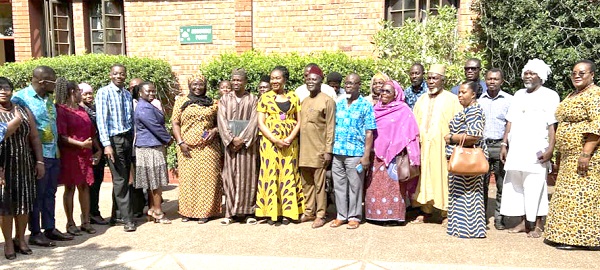
Population Council reviews reproductive health education policy
Statistics available to the Ghana Health Service (GHS) suggest that the country records over 100,000 teen pregnancies annually.
The figure, it said, contributed significantly to maternal and child mortality and morbidity, as well as a high prevalence of HIV among young people from 15 to 24 years.
Advertisement
The Executive Director of the National Population Council (NPC), Dr Leticia Adelaide Appiah, made this known at a Reproductive Health Education (RHE) Policy Review Meeting for religious bodies in Accra in December last year.
The RHE policy review meeting became necessary because it was essential for young people to protect themselves from unwanted pregnancy, HIV and sexually transmitted infections, promote values of tolerance, mutual respect and non-violence in relationships and support a safe transition into adulthood.
To this end, the policy calls for an age-appropriate comprehensive RHE, which is essential for young people to be assertive, protect and respect themselves and others.
It is therefore to help address these and other health-related issues, that Ghana, like many other African countries, launched 'the Comprehensive Sexuality Education Guidelines for both in and out-of-school children, but which received opposition from some Ghanaians.
So as part of efforts to address the concerns, the NPC organised a stakeholder meeting to review policy guidelines on RHE in the country.
The objectives of the review was to solicit the inputs and buy-in of religious leaders into the National RHE guidelines.
According to Dr Appiah, the implications of data to the health, education, employment, social lives, national security, and sustainable development, warrant individual, community and national attention.
Hence, she said “our quest to continue this dialogue till we arrive at a consensus where each stakeholder plays its part to achieve our common goal of healthy population from childhood through adulthood for sustainable development”.
Further quoting the 2021 PHC, she said, over 85 per cent of the population had religious affiliation hence religious authorities were major stakeholders in the dialogue.
She said as religious leaders they were best resources who could come out with effective honest communication to share knowledge, understand new points of view and to be understood saying, ignorance, misinformation and disinformation were burdens none should be allowed to carry in a 21st century world “where knowledge abounds as a common good.”
Dr Appiah said physical, mental and psychological health could not be achieved and maintained in misinformation hence the need to constantly communicate to improve knowledge and skill for individual and shared well-being.
She said all the negative barriers frustrated efforts in translating youthful opportunity into performance or desired human capital to promote sustainable development.
Age appropriate education
The Consultant, who is a Senior Lecturer, University of Cape Coast, Dr Joshua Amo-Adjei, who gave the Ghana Education Services (GES) position on RHE said pupils and students needed some form of RHE framed in culturally sensitive, socially acceptable and morally and age-appropriate.
He said faith-based organisations also should be actively involved in formulating the curriculum especially, those on sociocultural and moral dimensions
On the age appropriateness of the document, he said the starting age had been changed from four years to six where children would be taught values and society, and personal norms.
The policy ends at age 24 where he said young adults would be taught pregnancy-related issues and childbirth, building healthy relationships, avoiding violence within relationships among others.
Writer’s [email protected]




